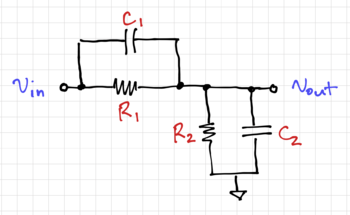Difference between revisions of "220-A1.2"
| Line 21: | Line 21: | ||
We can then build a simple 10X oscilloscope probe circuit with an input impedance of <math>1\,\mathrm{M\Omega}</math> and an input capacitance of <math>1\,\mathrm{pF}</math> using <math>R_1 = 900\,\mathrm{k\Omega}</math>, <math>R_2 = 100\,\mathrm{k\Omega}</math>, <math>C_1 = 1.11\,\mathrm{pF}</math>, and <math>C_2 = 10\,\mathrm{pF}</math>. Since the pole and zero cancel each other out, the bandwidth of the probe circuit is not limited by its RC values. | We can then build a simple 10X oscilloscope probe circuit with an input impedance of <math>1\,\mathrm{M\Omega}</math> and an input capacitance of <math>1\,\mathrm{pF}</math> using <math>R_1 = 900\,\mathrm{k\Omega}</math>, <math>R_2 = 100\,\mathrm{k\Omega}</math>, <math>C_1 = 1.11\,\mathrm{pF}</math>, and <math>C_2 = 10\,\mathrm{pF}</math>. Since the pole and zero cancel each other out, the bandwidth of the probe circuit is not limited by its RC values. | ||
| + | |||
| + | Let's look at the frequency response and transient response of this circuit using ngspice. | ||
| + | |||
| + | === Simulating the RC Voltage Divider === | ||
| + | Let us use the SPICE netlist below: | ||
| + | |||
| + | <source lang="text" line> | ||
| + | * Wideband Voltage Divider Circuit | ||
| + | * LPA 05 Aug 2020 | ||
| + | |||
| + | .options savecurrents | ||
| + | |||
| + | R1 in out 900k | ||
| + | R2 out 0 100k | ||
| + | |||
| + | C1 in out 1.1111p | ||
| + | C2 out 0 10p | ||
| + | |||
| + | * increase C1 and see what happens | ||
| + | R1a in outa 900k | ||
| + | R2a outa 0 100k | ||
| + | |||
| + | C1a in outa 1.6p | ||
| + | C2a outa 0 10p | ||
| + | |||
| + | * decrease C1 and see what happens | ||
| + | R1b in outb 900k | ||
| + | R2b outb 0 100k | ||
| + | |||
| + | C1b in outb 0.7p | ||
| + | C2b outb 0 10p | ||
| + | |||
| + | * input square wave | ||
| + | V1 in 0 dc 1 ac 1 pulse(-1 1 0 0.1u 0.1u 5u 0.01m) | ||
| + | |||
| + | .control | ||
| + | |||
| + | ac dec 10 1 1G | ||
| + | plot vdb(out) vdb(outa) vdb(outb) | ||
| + | wrdata testac.dat v(out) v(outa) v(outb) | ||
| + | |||
| + | tran 0.01u 0.03m | ||
| + | plot v(out) v(outa) v(outb) | ||
| + | wrdata testtran.dat v(out) v(outa) v(outb) | ||
| + | |||
| + | .endc | ||
| + | |||
| + | .end | ||
| + | |||
| + | </source> | ||
== A Lossy LC Tank == | == A Lossy LC Tank == | ||
== A Simple Switched-Capacitor Circuit == | == A Simple Switched-Capacitor Circuit == | ||
Revision as of 11:28, 7 August 2020
- Activity: Simulating simple RLC circuits
- At the end of this activity, the student should be able to:
- Run DC, AC, and transient simulations using ngspice.
Contents
A Wideband RC Voltage Divider
One way to build high-speed circuits with relatively large input impedances and capacitances is to use a simple RC voltage divider, as shown in the figure below. This RC divider is commonly found in oscilloscope 10X probes.
Let and similarly . Thus, the output voltage can be expressed as:
-
(1)
-
Notice that we can cancel out the pole with the zero when we set , or equivalently,
-
(2)
-
Intuitively, we can think if this as a resistive voltage divider at low frequencies, and a capacitive divider with the same ratio at high frequencies. Thus, the output voltage will simply be equal to:
-
(3)
-
We can then build a simple 10X oscilloscope probe circuit with an input impedance of and an input capacitance of using , , , and . Since the pole and zero cancel each other out, the bandwidth of the probe circuit is not limited by its RC values.
Let's look at the frequency response and transient response of this circuit using ngspice.
Simulating the RC Voltage Divider
Let us use the SPICE netlist below:
1 * Wideband Voltage Divider Circuit
2 * LPA 05 Aug 2020
3
4 .options savecurrents
5
6 R1 in out 900k
7 R2 out 0 100k
8
9 C1 in out 1.1111p
10 C2 out 0 10p
11
12 * increase C1 and see what happens
13 R1a in outa 900k
14 R2a outa 0 100k
15
16 C1a in outa 1.6p
17 C2a outa 0 10p
18
19 * decrease C1 and see what happens
20 R1b in outb 900k
21 R2b outb 0 100k
22
23 C1b in outb 0.7p
24 C2b outb 0 10p
25
26 * input square wave
27 V1 in 0 dc 1 ac 1 pulse(-1 1 0 0.1u 0.1u 5u 0.01m)
28
29 .control
30
31 ac dec 10 1 1G
32 plot vdb(out) vdb(outa) vdb(outb)
33 wrdata testac.dat v(out) v(outa) v(outb)
34
35 tran 0.01u 0.03m
36 plot v(out) v(outa) v(outb)
37 wrdata testtran.dat v(out) v(outa) v(outb)
38
39 .endc
40
41 .end












